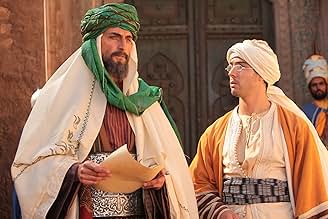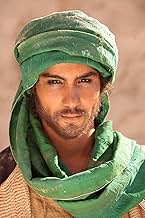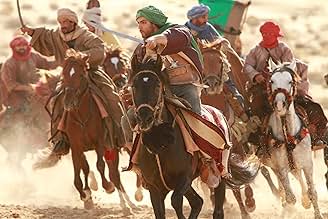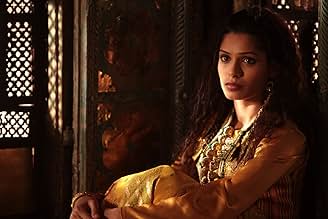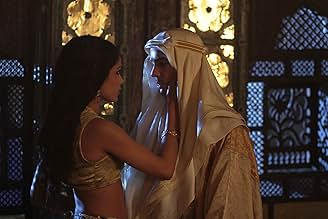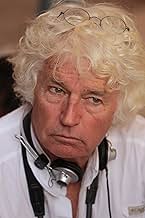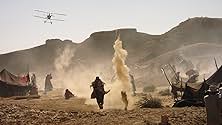Set in the 1930s Arab states at the dawn of the oil boom, the story centers on a young Arab prince torn between allegiance to his conservative father and his modern, liberal father-in-law.Set in the 1930s Arab states at the dawn of the oil boom, the story centers on a young Arab prince torn between allegiance to his conservative father and his modern, liberal father-in-law.Set in the 1930s Arab states at the dawn of the oil boom, the story centers on a young Arab prince torn between allegiance to his conservative father and his modern, liberal father-in-law.
- Awards
- 1 nomination total
Featured reviews
Directed by Jean-Jacques Annaud Set in the 1930s Arab states at the dawn of the oil boom, the story centers on a young Arab prince torn between allegiance to his conservative father and modern, liberal father-in-law (plot), it is the highest budget Arabian related film since LAWRENCE OF ARABIA (1962) and was one of the most anticipated film events in the international film community this season, despite the hype, however, the film was met with mixed reviews after the press screening and premier. Expectations were high and while many were left dissatisfied, others rated it a smashing success as it apparently followed the book to a tee, I have not read the book so perhaps I am missing something, but being that I have seen a number of impressive films of late that were made for under the $1 million mark, BLACK GOLD felt like a significant letdown with its $55 million production price-tag and lackluster deliverance.
The highlight of the film was a fantastic performance by lead role Tahar Rahim (A PROPHET, 2009), his soulful eyes and magnetic vulnerability can work in any film whether speaking or just looking into the camera sans dialogue. Mark Strong also plays a great bearded royal Arabian Sultan Amar, even though he speaks with a distinguishable British accent. The roles that threw the film off were those of Antonio Banderas and Freida Pinto. It is almost impossible to watch Banderas play Bedouin Sheik Nassib without constantly being reminded that he is, in fact, Antonio Banderas. Freida Pinto lends the film her stunning Indian looks as Princess Leyla, but unfortunately her dialogue consists of cliché one-liners that might have saved the movie if not uttered; of course bad film writing is bad writing however delivered.
3,5/5
The highlight of the film was a fantastic performance by lead role Tahar Rahim (A PROPHET, 2009), his soulful eyes and magnetic vulnerability can work in any film whether speaking or just looking into the camera sans dialogue. Mark Strong also plays a great bearded royal Arabian Sultan Amar, even though he speaks with a distinguishable British accent. The roles that threw the film off were those of Antonio Banderas and Freida Pinto. It is almost impossible to watch Banderas play Bedouin Sheik Nassib without constantly being reminded that he is, in fact, Antonio Banderas. Freida Pinto lends the film her stunning Indian looks as Princess Leyla, but unfortunately her dialogue consists of cliché one-liners that might have saved the movie if not uttered; of course bad film writing is bad writing however delivered.
3,5/5
They don't make many movies like this anymore, it felt like somebody had discovered a lost gem from the 1970s, with real extras, real horses and real camels instead of the soulless computer copies of todays CGI productions. I loved it! Also the story remained interesting, when the Prince has a difficult decision to make whose side he'll be on.
The story apparently is not precisely following actual historical events, but takes the liberty of creating a world of the 1930s like it could have been. No maps are shown on the screen to show which army moves where, because it is the general feeling of a changing world that matters, the struggle between different attitudes, not the history lesson. I do not know why this artistic freedom is making some viewers complain. Hundreds of western movies described battles between soldiers and Indians which were only vaguely similar to actual history, so I don't think this discussion is necessary. "Black Gold" is an adventure movie, first of all. Actually, the makers balance very well between the entertainment value and ambitions beyond that, neither too heavy nor too light. A good compromise was found between a commercial approach and content that has something to say. When the oil flows over the ground, useless like a pond of black ink, one wonders: is it worth all that fighting? One review here said 'the director made a mistake, there is no pipeline', which proves that the poetry of pictures is really lost on some people. Anyway.
The makers, supported by the Emirate of Qatar, succeeded in putting the Arabs in the focus, and if the American guy from Texas Oil remains a cartoon character with a silly hat, it's hardly an accident. Best actors to me were Tahar Rahim as Prince Auda and Mark Strong as Amar, his father. Antonio Banderas, however, had a license for staring, it seems. Any time he has got a close-up without much to say: yes, he stares in an interesting way. The director could have told him him not to overdo it, but I guess it's easier said than done.
The story apparently is not precisely following actual historical events, but takes the liberty of creating a world of the 1930s like it could have been. No maps are shown on the screen to show which army moves where, because it is the general feeling of a changing world that matters, the struggle between different attitudes, not the history lesson. I do not know why this artistic freedom is making some viewers complain. Hundreds of western movies described battles between soldiers and Indians which were only vaguely similar to actual history, so I don't think this discussion is necessary. "Black Gold" is an adventure movie, first of all. Actually, the makers balance very well between the entertainment value and ambitions beyond that, neither too heavy nor too light. A good compromise was found between a commercial approach and content that has something to say. When the oil flows over the ground, useless like a pond of black ink, one wonders: is it worth all that fighting? One review here said 'the director made a mistake, there is no pipeline', which proves that the poetry of pictures is really lost on some people. Anyway.
The makers, supported by the Emirate of Qatar, succeeded in putting the Arabs in the focus, and if the American guy from Texas Oil remains a cartoon character with a silly hat, it's hardly an accident. Best actors to me were Tahar Rahim as Prince Auda and Mark Strong as Amar, his father. Antonio Banderas, however, had a license for staring, it seems. Any time he has got a close-up without much to say: yes, he stares in an interesting way. The director could have told him him not to overdo it, but I guess it's easier said than done.
Jean-Jacques Annaud's "Day of the Falcon" (also known as "Black Gold") attempts to deliver an epic historical drama set against the backdrop of the Arabian oil boom. While the film boasts undeniably stunning cinematography, capturing the vast beauty of the desert landscapes, and features an ambitious scope with large-scale battle sequences, its narrative often struggles. The dialogue can feel stilted and unnatural, and the performances, despite a talented international cast including Antonio Banderas and Mark Strong, sometimes lack the necessary emotional depth to fully engage the audience. The pacing can be uneven, and the film's attempt to blend historical commentary with a personal love story occasionally feels forced, resulting in a visually impressive but ultimately less impactful cinematic experience.
Is it worth watching? If you appreciate grand historical visuals and sweeping desert epics, it might offer some enjoyment. However, if you prioritize strong character development, natural dialogue, and a consistently engaging plot, you might find it a somewhat tedious watch.
Is it worth watching? If you appreciate grand historical visuals and sweeping desert epics, it might offer some enjoyment. However, if you prioritize strong character development, natural dialogue, and a consistently engaging plot, you might find it a somewhat tedious watch.
In the beginning of the Twentieth Century, in Arabia, Emir Nesib (Antonio Banderas) of Hobeika defeats Sultan Amar (Mark Strong) of Salma after years of war between their tribes and they make a peace treaty creating "The Yellow Belt", a large no man's land that would separate their lands and would not belong to neither of them. Further, Nesib demands the sons of Amar, Saleh and Auda, to be raised together with his children Tarik and Leyla by him in Hobeika as a guarantee of their agreement.
Fifteen years later, representatives of the Texas Oil find oil in the Yellow Belt and the modern and liberal Emir Nesib sees the opportunity to improve and modernize the life of his tribe, building hospitals and schools, and the American Company begins the exploitation of the oil field, violating the peace pact.
Nasib sends a representative to make an agreement with the fundamentalist Sultan Amar, but he does not accept the offer. Saleh decides to travel to Salma to talk to his father and kills his two companions, but he is captured and murdered by Tarik. Prince Auda (Tahar Rahim) and Princess Leyla (Freida Pinto) are in love with each other since they were children and they get married with the full permission of Nesib. Auda travels to Salma expecting to convince his father to associate to Nesib, but the conservative Amar does not accept the proposal and decides to fight against Nesib. Now, Prince Auda shall decide in which side he will pick and fight.
"Black Gold" is another wonderful epic adventure by the French director Jean-Jacques Annaud with a great international cast and wonderful cinematography in an environment of "Lawrence of Arabia". The story is entertaining, the soundtrack is very beautiful and the DVD has magnificent Extras showing the Making Of and the Special Effects. My vote is eight.
Title (Brazil): "O Príncipe do Deserto" ("The Prince of the Desert")
Fifteen years later, representatives of the Texas Oil find oil in the Yellow Belt and the modern and liberal Emir Nesib sees the opportunity to improve and modernize the life of his tribe, building hospitals and schools, and the American Company begins the exploitation of the oil field, violating the peace pact.
Nasib sends a representative to make an agreement with the fundamentalist Sultan Amar, but he does not accept the offer. Saleh decides to travel to Salma to talk to his father and kills his two companions, but he is captured and murdered by Tarik. Prince Auda (Tahar Rahim) and Princess Leyla (Freida Pinto) are in love with each other since they were children and they get married with the full permission of Nesib. Auda travels to Salma expecting to convince his father to associate to Nesib, but the conservative Amar does not accept the proposal and decides to fight against Nesib. Now, Prince Auda shall decide in which side he will pick and fight.
"Black Gold" is another wonderful epic adventure by the French director Jean-Jacques Annaud with a great international cast and wonderful cinematography in an environment of "Lawrence of Arabia". The story is entertaining, the soundtrack is very beautiful and the DVD has magnificent Extras showing the Making Of and the Special Effects. My vote is eight.
Title (Brazil): "O Príncipe do Deserto" ("The Prince of the Desert")
I remember when Lawrence of Arabia came out, long ago. The most stunning things about it were Peter O'Toole, the haunting music, and the hard won shots of the desert. I would have traded it all to learn the details of desert warfare, but it failed to do more than offer a glimpse. Instead it wallowed in Lawrence's tortured mind to little purpose, creating a deeply dissatisfying movie. Now, years later, my antidote has come in the form of a real story, the kind I longed for as a kid, but seldom found.
If you consider the people of the Arabian desert savage, superstitious barbarians, you won't be able to enjoy this movie. But if you can suspend your prejudice long enough to be convinced, they do a fine job of conveying how a totally foreign and ancient culture can make more than a little sense in today's world.
Is it all fantasy, these unusually noble men with their deep distrust of western values? I doubt it. There are always ineffable things about a people's true dreams and character that have little to do with their actual history, that can only really be expressed in art. If I were Arab I'd be very happy to see a movie like this about how my forefathers reacted to the first oil wells and the riches they promised.
The lead, Tahar Rahim, is spot on as the bookish Prince Auda, turned fighter. His father Mark Strong as the Sultan Amar has some of the best lines and is a strong and welcome presence throughout. Antonio Banderas worked for me as Emir Nesib and I admire his entire career. There's no doubt in my mind he was fully committed to this movie though some apparently found his performance distracting; I did not. As others have pointed out, Freida Pinto and Liya Kebede, as the female leads, are both fairly wasted here though there's something true about how minor their roles are given this is mostly a story about change, war and father-son relations.
No, I might forever be labeled a low brow for writing this, but I enjoyed this film much more than I did the highly acclaimed Lawrence of Arabia. This is a far more earnest and effecting film and deserves a great deal more praise than it's likely to get in the west given our politics. That's truly a shame as we could use a little sympathy and insight into these people.
If you consider the people of the Arabian desert savage, superstitious barbarians, you won't be able to enjoy this movie. But if you can suspend your prejudice long enough to be convinced, they do a fine job of conveying how a totally foreign and ancient culture can make more than a little sense in today's world.
Is it all fantasy, these unusually noble men with their deep distrust of western values? I doubt it. There are always ineffable things about a people's true dreams and character that have little to do with their actual history, that can only really be expressed in art. If I were Arab I'd be very happy to see a movie like this about how my forefathers reacted to the first oil wells and the riches they promised.
The lead, Tahar Rahim, is spot on as the bookish Prince Auda, turned fighter. His father Mark Strong as the Sultan Amar has some of the best lines and is a strong and welcome presence throughout. Antonio Banderas worked for me as Emir Nesib and I admire his entire career. There's no doubt in my mind he was fully committed to this movie though some apparently found his performance distracting; I did not. As others have pointed out, Freida Pinto and Liya Kebede, as the female leads, are both fairly wasted here though there's something true about how minor their roles are given this is mostly a story about change, war and father-son relations.
No, I might forever be labeled a low brow for writing this, but I enjoyed this film much more than I did the highly acclaimed Lawrence of Arabia. This is a far more earnest and effecting film and deserves a great deal more praise than it's likely to get in the west given our politics. That's truly a shame as we could use a little sympathy and insight into these people.
Did you know
- TriviaThe film was shot in Tunisia and Qatar. The battle scenes were shot in the deserts of Qatar and took over four weeks to shoot.
- Quotes
Prince Auda: God hates the things we do in His name. He hates that.
- ConnectionsFeatured in Projector: Black Gold (2012)
- SoundtracksI'm Sitting On The Top of The World
Written by Ray Henderson, Sam Lewis and Joe Young
- How long is Day of the Falcon?Powered by Alexa
Details
- Release date
- Countries of origin
- Official sites
- Language
- Also known as
- Vàng Đen
- Filming locations
- Empire Studios, Latrach, Tunisia(Studio)
- Production companies
- See more company credits at IMDbPro
Box office
- Budget
- €40,000,000 (estimated)
- Gross worldwide
- $5,452,142
- Runtime
- 2h 10m(130 min)
- Color
- Sound mix
- Aspect ratio
- 2.35 : 1
Contribute to this page
Suggest an edit or add missing content





